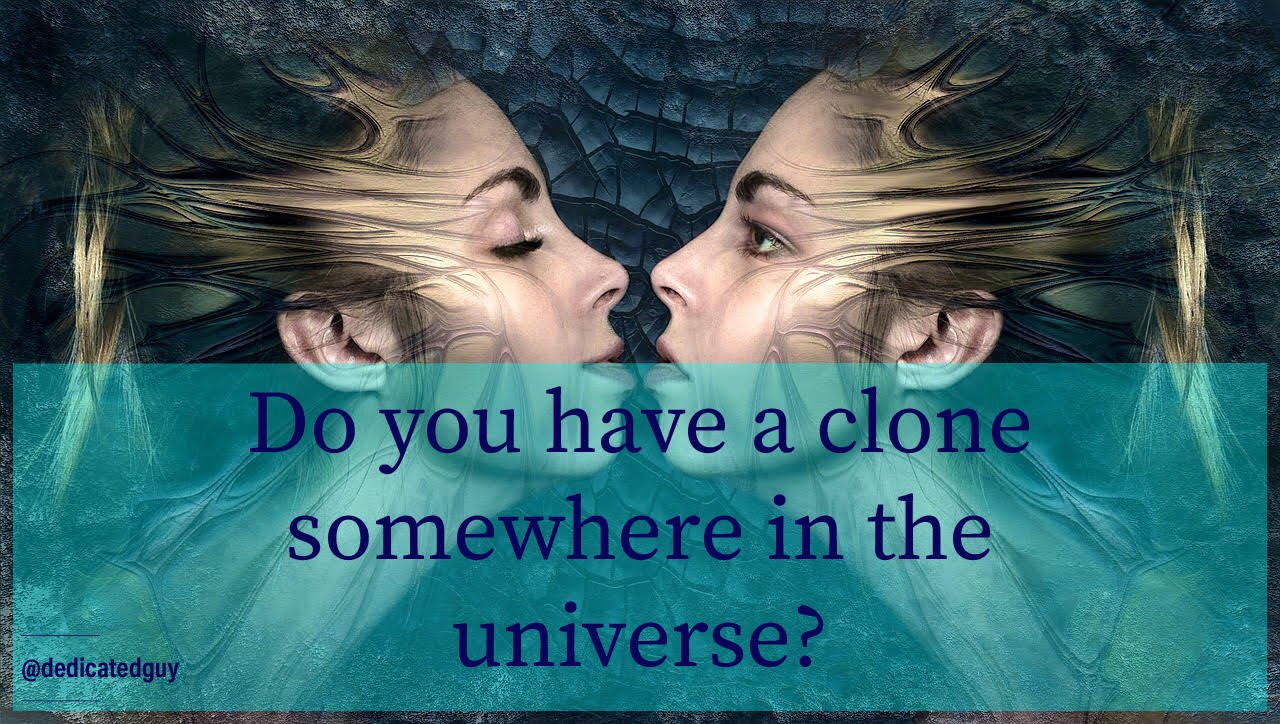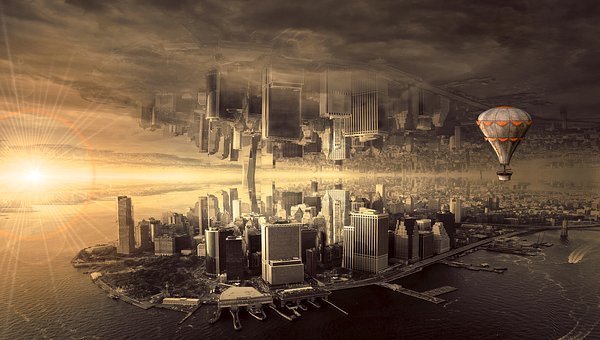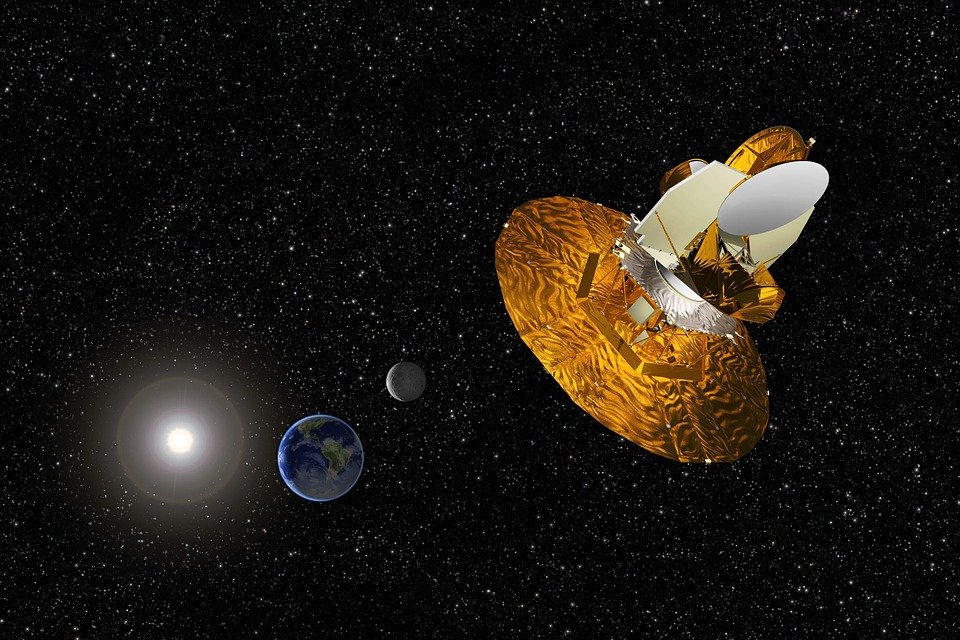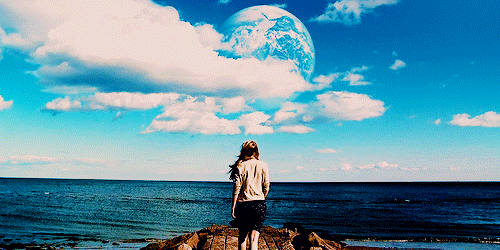I don’t know about you, but since I was little I have enjoyed looking up to the stars and wonder about the secrets of the universe. I have always believed in alien life, and as a funny fact my first science project for school was a little investigation about black holes, which I now realize are probably the most mysterious objects in existence.
I see our universe as the last frontier of knowledge and I believe our long term goal (centuries and even millenniums from now), is to conquer this frontier.

Today I want to discuss a interested subject about our universe and reality.
Do you have a copy of yourself somewhere in the universe?

This path will not run through the terrain of science fiction. Everything we are going to find on this post has a scientific basis, even when apparently it could be conjecture or speculation.
We will investigate first the possible existence of other universes. If we do not succeed in this first step, our path will have been short. If, on the contrary, we find evidence that the universe in which we live is not unique, we will look for someone identical to us, where it is also possible to find a replica of the Earth and you.
Are there other universes?
For us, universe (or our universe) is what the human being, with its technology, manages to observe. Thanks to probes such as the "WMAP" (sent to space in 2001 by NASA) which according to NASA:

studied conditions of the early universe by measuring the properties of cosmic microwave background radiation and produced the first full-sky microwave map with resolution under one degree, about the angular size of the moon. Designed for a 27 month mission, WMAP took three months to transit to Sun-Earth L2 libration point nearly one million miles from earth. | Source
Or the "Planck" (launched in 2009 by the European Space Agency) which according to ESA:
Planck is measuring tiny fluctuations in the CMB with unprecedented accuracy, providing the sharpest picture ever of the early Universe — when the cosmos was only 380 000 years old. This will allow cosmologists to zero-in on theories that describe the Universe's birth and evolution. | Source
scientists have been able to accurately determine many data from our universe: radio, volume, total amount of material it contains, composition, age (approximately 13,800 million years), etc. These probes also tell us that the universe has a flat geometry and confirms the "Big Bang" theory as the beginning of everything.
WMAP Probe
The most famous theory explaining our universe’s origin is the popular Big Bang
The Big Bang Theory is the leading explanation about how the universe began. At its simplest, it says the universe as we know it started with a small singularity, then inflated over the next 13.8 billion years to the cosmos that we know today. | Source

After the Big Bang explosion, there was only uniform gas at a very high temperature. This gas expands, cools and transforms over millions of years, giving rise to the appearance of space, galaxies and all the matter that surrounds us. The question, still in permanent debate, is was there a moment before the big explosion.
Alan Guth, the American cosmologist make a proposal in 1981 called “Theory of Inflation” which goes like this:
According to inflation theory, the universe was created in an unstable energy state, which forced a rapid expansion of the universe in its early moments. One consequence is that the universe is vastly bigger than anticipated, far larger than the size that we can observe with our telescopes. | Source
The defenders of the theory argue that the inflation nevertheless has a limited period of life, after which it decays, that is to say it slows down, and although it continues to expand, it does so now at a much slower rate.
The Inflation Theory proposes a period of extremely rapid (exponential) expansion of the universe during its first few moments. It was developed around 1980 to explain several puzzles with the standard Big Bang theory, in which the universe expands relatively gradually throughout its history. | Source
The Big Bang

Our universe is ultimately the result of one of those "Big Bang". Outside of it, inflation continues, expands and doubles its size in fractions of a second, creating new "Big Bangs" and new universes. After each "Big Bang", the expansion in the newborn universe slows down (ours is currently expanding and doubling its size every 8,000 million years).
Consequently, the Theory of Inflation predicts the formation of universes in different moments and spaces as part of the decay of the inflationary rate. Since the process is eternal, the number of universes created, as predicted by this theory, is necessarily infinite.
Inflation process
If we assume this as true and say that inflation theory is correct, we are implying the fact that there are indeed infinite universes.
For now and for the sake of its credibility, let's just point out that Inflation is already considered by the scientific community as part of the cosmological model of the creation of the universe and that it has been able to explain some physical phenomena.
Is there even a slightly opportunity for some of those universes to be 100% exactly like ours?
Our universe is extremely particular and is governed by very specific physical laws. When we were little we were taught in school or later in the university (depending in which classes we took) concepts such as: gravity, thermodynamics and relativity. We exist because these laws are exactly as they are, if these laws were different, the universe itself would also be completely different.

For example, the theory of universal gravitation says that the force with which two masses are attracted (say two planets) separated by a distance "d" decreases with the factor d2. This is true not because Isaac Newton said it more than three hundred years ago, but because our universe works in this way, whether it is by simple chance or by design.
If instead of d2 this factor were d3, there would be no galaxies, no planets, or anything observable as we know it. Other things would probably exist, but we do not know which ones. We would be talking about a different kind of universe, literally out of our imagination.
If the infinite universes come from the same origin and were created in identical form, it would be logical to think that they are all governed by the same principles, but in reality it does not have to be that way, because the initial conditions in which each one of them were created can change everything. Everyone of the different universes had their own moment and circumstances. Which increases the possibility of there being infinite universes but with substantial differences between each other’s, like different physical laws for example.
I already know that all this can sound like a tremendous nonsense, because no tangible reality makes us suspect that physical laws different from those that govern our environment can actually exist. It is hard to believe that in some place matter could have more than the three states we know (solid, liquid or gas), that there is no movement, that things have no color ... But, remember the allegory of Plato's cave. Which goes like this:
Plato claimed that knowledge gained through the senses is no more than opinion and that, in order to have real knowledge, we must gain it through philosophical reasoning. | Source

Which in simple words means, every data we are able to gather thanks to our technology, might not be enough in order to really understand our universe and our reality.
Nevertheless, I am optimist about the future, and I really think we would continue to develop our current knowledge and improving our current devices, until one day we reach a state of such advanced technology, that the universe itself could be the equivalent of our backyard.
Conclusion
We have seen so far that it is apparently possible the existence of infinite universes, which could also be governed by different physical laws. Which means we have no idea about how these universes could actually look like. And the remote possibility of us actually having a clone in another universe will always be there, but highly unlikely for now.
Nevertheless, we are just scratching the surface of this subject. Stay tuned for the next entry.
References
NASA back hole
NASA WMAP
ESA planck
Space
thoughtco
wmap.gsfc.nasa.gov
philosophyzer
physicsclassroom
Image Sources are from pixabay except the last 2
If these titles sound interesting to you, I assure you the articles will be even better!

How can we create the future by thinking about it?
About our most valuable possession.
Teaching our synthetic children
Thoughts on "Artificial Intelligence and Consciousness"
Reflections about trusting other people
"A day in the future": Using our body's kinetic energy to power a micro GPS
Sometimes the best thing is to say "No"
